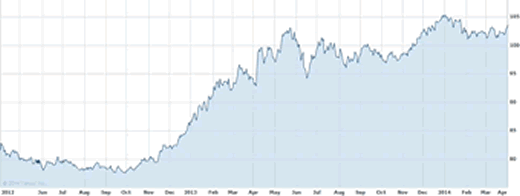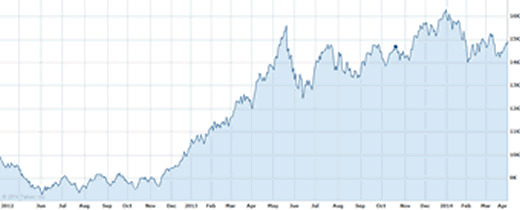Abenomics Stagflation - It's in Shinzo Abe's (Political) Genes
Economics / Stagflation Apr 06, 2014 - 05:06 PM GMTBy: Richard_Mills
 Japanese Prime Minister Shinzo Abe's "Abenomics" goal was to end a long miserable decade and a half of deflation by kick starting the economy. This was going to happen because of massive yen creation. The fiat balloon would induce consumers to spend and corporations to reinvest profits, convinced by a rising stock market and surging exports that all is well.
Japanese Prime Minister Shinzo Abe's "Abenomics" goal was to end a long miserable decade and a half of deflation by kick starting the economy. This was going to happen because of massive yen creation. The fiat balloon would induce consumers to spend and corporations to reinvest profits, convinced by a rising stock market and surging exports that all is well.
The Bank of Japan pumped liquidity into the economy at a pace even faster than the U.S. Federal Reserve - $60 billion a month versus $85 billion (the U.S. economy is three times larger than Japan's).

The flood of fiat did depreciate the yen, over the first six months of 2013 the yen weakened the most against the U.S. dollar since 1982.
The yen also dropped 12 percent against the euro and seven percent against the sterling, threatening European trade.
As Japanese efforts started paying off factory output rose, retail sales slowly started climbing and some inflation came creeping into consumer prices.
The weaker yen also drew investment away from emerging markets and toward Japanese equities - the Nikkei 225 soared.

"His plan, one of the world's most audacious experiments in economic policy in recent memory, combines a flood of cheap cash (doubling the money supply in two years), traditional fiscal stimulus and deregulation of Japan's notoriously ingrown corporate culture. The hope is that this will yank Japan from a debilitating deflationary spiral of lower prices and diminished expectations, stirring what Keynes called the "animal spirits" of investors and consumers.
And so it has. The stock market has soared more than 60 percent over the past year, and the yen has lost more than a quarter of its value, lifting corporate earnings in a country that is dependent on exports." Martin Fackler, 'Japan's New Optimism Has Name: Abenomics' The New York Times
The Real Deal
Many became convinced that Abenomics was the real deal meal because Japan had five quarters of high growth.
Unfortunately the wheels seem to be falling off. Japan's GDP expanded at just an annualized one percent during the last three months of 2013. On a quarter-on-quarter basis that's just 0.3% growth, the same as during Q3.
The Nikkei 225-stock index has fallen 8.98 percent in the quarter ending March 31, ending a five-quarter winning streak that still has the market up 68.8 percent since November 2012.
Bloomberg says foreign investors sold 975 billion yen ($9.5 billion) of Japanese shares in one week in March, the most since the crash of 1987.
According to Japan's Ministry of Finance foreign asset managers have pulled more than $21 billion out of the nation's equities so far in 2014.
Most alarming is that Japanese salaries have dropped 15 percent over the past 15 years and the trend is expected to continue...
"Japanese employers will fail in the next fiscal year to heed Prime Minister Shinzo Abe's goal of wage increases that outpace inflation, highlighting risks that the nation's recovery will stall, surveys of economists show.
Labor cash earnings, the benchmark for wages, will increase 0.6 percent in the year starting April 1, according to the median forecast in a poll of 16 economists by Bloomberg News. Consumer prices will climb five times faster, increasing 3 percent, as Japan raises a sales tax for the first time since 1997, a separate Bloomberg survey shows.
The squeeze on consumers from higher prices risks undermining public support for Abenomics and dragging on retail spending." James Mayger and Cynthia Li, Bloomberg 'Japan Consumer Prices Seen Rising Five Times as Fast as Wages'
What's a prime minister to do? Well it's this authors opinion Abe will continue to print and debase the currency along with adding more fiscal stimulus.
These are the first two arrows in his much talked about three arrow Abenomics quiver. The third arrow, structural reform, has received little attention from the government.
That's an unfortunate circumstance because for nearly twenty long years demand has remained far below potential supply capacity - what's known as a deflationary gap. The only sustainable way out for the Japanese economy is for the government to increase growth potential through higher efficiency.
That will be almost impossible because of demographics.
Japan most serious problem is demographics, the ageing and shrinking of Japan's population is a significant demographic drag on growth. Japan's productive age population (15 - 64 years old) is projected to shrink by roughly 25 percent, some have the figure as high as 40 percent, by 2035.
Today the ratio between working-age people and retirees is roughly 4 to 1, but it will be 2 to 1 in 20 years.
This creates two very obvious problems:
-
Many industries will have to be scaled down - an aging society is not one predisposed to increasing consumption nor will the existing workforce be able to keep up the pace in an export dependent economy.
-
Controlling social security expenditures in the face of a rapidly aging population is going to be extremely difficult without raising taxes on those still working. And raising taxes will have a hugely negative impact on growth.
Whether you consider Abenomics a success, or not, many experts are questioning its sustainability.
Real term wages are set to drop by two percentage points in 2014. The domestic consumption tax is set to rise from five percent to eight percent this month. These two factors will cause a drop in consumption and a slowdown in economic growth activity.
"The real risk it that the consumption tax will exacerbate the central problem with Abenomics -- a blow to household wealth and spending power as price rises accelerate ahead of income." Tom Orlik, Bloomberg economist in Beijing
A tax increase in 1997 has been credited with kick starting 16 years of economic shrinkage. The government has designed a 5.5 trillion yen stimulus package to counter the expected decline in consumer spending.
Add one part continued currency debasement, drop in two parts of fiscal stimulus, stir a cup or two of worsening demographics into this economic witch's brew and you've got the perfect recipe for Japanese stagflation.
Conclusion
The to do list of structural reforms needed in Japan is a huge mountain to climb:
- Greater international competition
- Higher female labor participation
- Employment deregulation
- Lower energy prices
- Corporate taxation
Whatever fiscal/monetary moves the government makes today will be continually undermined by Japan's demographics. Structural reforms are necessary now.
Unfortunately while talking a lot about the need for reform the reality on the ground, and in the boardrooms is there's been precious little actual reform. And this author doesn't expect much from Abe's revised 'third arrow' plan due in June 2014. The fact is Abe has been weak on reform and that's not going to change, you see it's built into his political genes.
Arch-conservatives have long dominated Japan's politics. They've made the Liberal Democratic Party (LDP) their home and have stamped out almost every effort at social reform. The founder of the LDP, and its most important leader was Nobusuke Kishi - Shinzo Abe's maternal grandfather.
The road to Japanese stagflation is being played out in real time on all our radar screens. It's playing on mine, is it on yours?
If not, it should be.
By Richard (Rick) Mills
If you're interested in learning more about the junior resource and bio-med sectors please come and visit us at www.aheadoftheherd.com
Site membership is free. No credit card or personal information is asked for.
Richard is host of Aheadoftheherd.com and invests in the junior resource sector.
His articles have been published on over 400 websites, including: Wall Street Journal, Market Oracle, USAToday, National Post, Stockhouse, Lewrockwell, Pinnacledigest, Uranium Miner, Beforeitsnews, SeekingAlpha, MontrealGazette, Casey Research, 24hgold, Vancouver Sun, CBSnews, SilverBearCafe, Infomine, Huffington Post, Mineweb, 321Gold, Kitco, Gold-Eagle, The Gold/Energy Reports, Calgary Herald, Resource Investor, Mining.com, Forbes, FNArena, Uraniumseek, Financial Sense, Goldseek, Dallasnews, Vantagewire, Resourceclips and the Association of Mining Analysts.
Copyright © 2014 Richard (Rick) Mills - All Rights Reserved
Legal Notice / Disclaimer: This document is not and should not be construed as an offer to sell or the solicitation of an offer to purchase or subscribe for any investment. Richard Mills has based this document on information obtained from sources he believes to be reliable but which has not been independently verified; Richard Mills makes no guarantee, representation or warranty and accepts no responsibility or liability as to its accuracy or completeness. Expressions of opinion are those of Richard Mills only and are subject to change without notice. Richard Mills assumes no warranty, liability or guarantee for the current relevance, correctness or completeness of any information provided within this Report and will not be held liable for the consequence of reliance upon any opinion or statement contained herein or any omission. Furthermore, I, Richard Mills, assume no liability for any direct or indirect loss or damage or, in particular, for lost profit, which you may incur as a result of the use and existence of the information provided within this Report.
Richard (Rick) Mills Archive |
© 2005-2022 http://www.MarketOracle.co.uk - The Market Oracle is a FREE Daily Financial Markets Analysis & Forecasting online publication.



